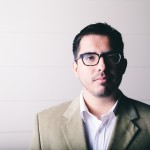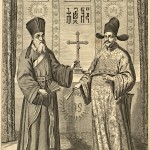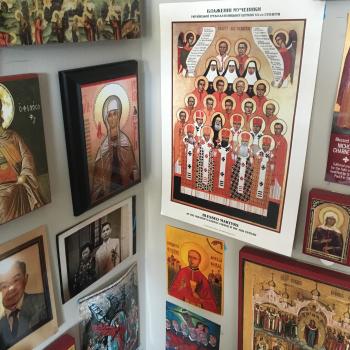![Theotokos of Vyshhorod, more popularly known as Theotokos of Vladimir (Vladimirskaya-1.jpg) [PD-US], via Wikimedia Commons](https://wp-media.patheos.com/blogs/sites/721/2016/08/Vladimirskaya-1.jpg)
This, of course, takes us right back to the American election in 2016, pitting Drumpf versus Hillary, Putin versus NATO, Syria versus Ukraine. A vote for one is a vote against the other, I’m told; if you’re for this, you’re anti that. I’m also told that it’s going to be war anyway, so just pick whichever one I want. The guy who wrote the Boston Globe piece doesn’t like American expansion; therefore he’s pro-Putin. Perhaps it appears, through my being chrismated in the UGCC, that I have chosen the side of Ukraine (and therefore NATO, and therefore Hillary) against Russia as an ideological choice.
I refuse to be labeled like this. It is, as Archbishop Job puts it, uncanonical.
Indeed, Archbishop Job reminds us that the political geography of churches is much more about canons than they are about what the Marxist philosopher Louis Althusser called ‘ideological state apparatuses‘ (ISA). An ISA, Althusser says, gets you ideologically by literally calling your name; ‘Hey, you,’ the ISA says, and if you turn around in response, you’re theirs – the technical term for this is interpellation. You could, of course, read what I’ve written here as me having turned around to the Hey, you of Ukraine, NATO, even Hillary, and if you must, it’s your prerogative. After all, Althusser also says that the original ISA was the Catholic Church, and here I am – I’ve become Ukrainian Catholic.
Archbishop Job complicates this ISA scenario. Along with Patriarch Sviatoslav, Archbishop Job admits that certain churches, like the Moscow Patriarchate, can cynically operate like an ISA. But it does not follow that all churches are ISAs, and that’s because a reading of the canons as oikonomia ultimately separate the church from the state. Much as even the canons that Archbishop Job cites are from a time when there were Roman and Byzantine Emperors, they also lay the groundwork for the church’s self-governance of itself without imperial backing, which is indeed what this whole question of autocephaly is basically about. To make the claim that Constantinople grants autocephaly is to make an extra-national claim, not least because Constantinople itself is not really the church of a nation anymore, but a very colonized part of the definitively non-Orthodox nation-state of Turkey. In this way, it doesn’t matter whether I’m part of the UGCC or who has what stake in the Kyivan Church; the question at a much more objective level is – What do the canons actually say about the Kyivan metropolis? How does the question of autocephaly show off the church’s commitment to practice oikonomia?
The same, then, goes for Syria. I don’t have to pick between Ukraine and Syria because I’m not picking between states. Instead, Antiochian Orthodoxy and the Melkite Greco-Catholic Church have to be understood canonically because what the persecution of Christians ultimately means is that our house is being destroyed. What is at stake in Syria (and Iraq) is also oikonomia. Here, indeed, the spat between Antioch and Jerusalem over Qatar becomes important because God’s house has become even more divided due to the introduction of competing bishops – uncanonical ones – on top of the violence that is already there. In the same way that Archbishop Job reads Ukraine canonically, Andrew Stephen Damick and Sam Noble also provide an eloquent canonical reading of Syria:
With the raging of ISIS and other jihadi groups throughout the Middle East, Antioch is being martyred once again: Not only the faithful but also clergy are being persecuted and killed in the name of a radical form of Islam. It has now been three years since two bishops (including the brother of Patriarch John of Antioch) were kidnapped without word of their whereabouts. And one of Antioch’s sister churches has taken advantage of her weakness with an aggressive provocation. In response to her appeals, there has been alternation between silence, betrayal, and deferment.
By asking canonical questions, Antioch is not calling for military intervention or state ideology – it has refused them in the past – but the adjudication of ecclesial autocephaly by Constantinople because what can be more important in the face of Daesh than the unity of Christians offering a way of love in a geography of war? Again, the focus on canonical autocephaly leads back to oikonomia. Moreover, they are ultimately making the same argument as Archbishop Job: for the sake of oikonomia, Constantinople (not Moscow) must exercise its primacy to defend the autocephaly of other churches looking to her to preside.
The same goes for the 2016 elections. We are faced with the demand to pick between two embodiments of American ideology, which reminds me that as I’ve written on Drumpf’s Tower ideology, I should write about what Tim Kaine calls Hillary’s ‘kids and family’ agenda. But as Christians, our house is the house of God, and the canons are for the building up of God’s house, not for American exceptionalism and expansionism. In this way, perhaps we could stop talking about voting our consciences and think about what it would mean to act conscientiously this November for the sake of the whole world in the care for what Pope Francis and the Ecumenical Patriarch Bartholomew have termed the ‘care for the common home.‘ I think that too is called oikonomia, and I think it would be fruitful for Eastern Christians in the Americas to reflect on what Archbishop Job’s insistence on a canonical ecclesial politics would look like on our continent. After all, if Third Rome does not exist canonically, then neither does Manifest Destiny. Moreover, the state of multiple bishops from various national churches in the same American city is a serious canonical irregularity, and if we are really to consider the Americas on canonical terms, uniting the diaspora into a single church should be a top agenda item, as it was at the Holy and Great Council. What is at stake here is not just canons, but what it would look like to live together in a common home instead of a house divided by state and private interests, as we see in the current election in the most colonizing nation-state on this continent.
But the larger point of this exercise in closely reading Archbishop Job’s interview is that this is all part of my mystagogy. Despite some of my stronger statements in this piece – one has to be emphatic when one wants to emphasize – I am a neophyte trying to live the life of my church more deeply. A church is composed of persons, and the tools those persons use to build the church are canons, which are the only way to have oikonomia. In this way, ecclesial personhood seems somehow linked to canonical oikonomia. Maybe that’s a direction that I can explore in some other posts.












